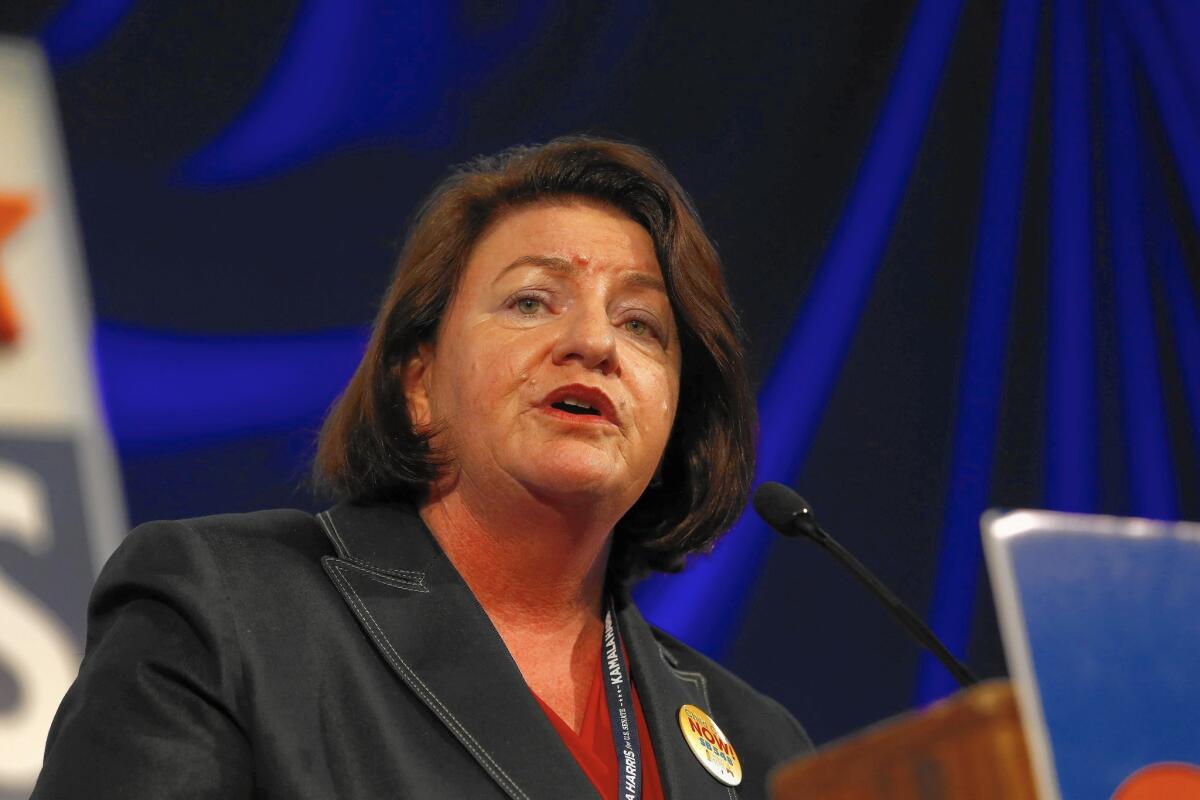Capitol Journal: Lawmakers squabble over reducing gas consumption

Democratic lawmakers are threatening to oust Assembly Speaker Toni Atkins (D-San Diego) even before the session adjourns Sept. 11.
- Share via
Reporting from Sacramento — Rebellion and chaos are dominating the climax of this year’s legislative session. Seems like nothing and no one is safe.
Democratic lawmakers are threatening to oust Assembly Speaker Toni Atkins (D-San Diego) even before the session adjourns Sept. 11.
Republican senators did boot their leader last week, two months before his previously agreed-upon departure. Sen. Bob Huff (R-Diamond Bar) apparently had looked too squishy on taxes, even if days earlier he had promised not to support raising them at the gas pump to repair highways.
“Republicans do not raise taxes,” the new minority leader, Sen. Jean Fuller (R-Bakersfield), told reporters. If Republicans do, she didn’t need to add, they suffer party punishment.
Assembly GOP Leader Kristin Olsen (R-Modesto) also is looking over her shoulder at ambitious wannabes.
Huff intends to run next year for a Los Angeles County supervisorial seat. And Olsen may be competing for a state Senate seat. That’s a time-honored rationale for lawmakers to dump their leaders, arguing they should be focused on caucus members’ races. But at this stage? Right before the session adjourns?
Also in the Assembly, and more significant, moderate Democrats are rebelling against Gov. Jerry Brown, Senate leader Kevin de León (D-Los Angeles) and the ambitious climate-change bill they’re pushing.
Moderate Democrats are linking their opposition to the global warming legislation with Atkins’ survival as speaker. Some are urging her to take a gasoline-reduction mandate out of the bill and subtly threatening to support a successor who would.
Atkins, who is termed out at the end of 2016, last week sent a letter to fellow Democrats asking them to hold off replacing her until the Legislature reconvenes in January, “for the stability of the house.”
The place doesn’t look very stable right now, however, and may not be worth trying to lead.
The governor still is not putting heat on individual Democrats to support his cherished global warming bill. He’s not much of a reward-and-punish guy.
But he told reporters: “I have no intention of backing down. We’re going to intensify our efforts to do lower-carbon fuels.”
The bill would require California, by 2030, to cut its petroleum use in half, double the energy efficiency of older buildings and generate half of its electricity from renewable sources. The measure, SB 350 by De León, passed the Senate on a party-line vote, 24 to 14.
The Assembly isn’t troubled by the proposed energy and building standards. But Dem moderates are blocking the vehicle fuel reduction.
The oil lobby, one of the biggest donors of political fuel — money — in Sacramento, has been running deceptive TV ads pressuring moderate lawmakers. And the spots are working. They assert ludicrously that the measure would lead to gas rationing and limits on how far a motorist could drive.
Such extreme action is inconceivable politically. Rationing? People wouldn’t tolerate it. We’re no longer fighting Hitler and Tojo.
But opponents do have one valid point: The bill would allow the unelected California Air Resources Board to decide how gasoline use is reduced. More appropriately, the motorists’ elected representatives — legislators — should have a say in that.
Some Assembly Democrats want to require legislative approval of any air board regulations. Forget that, says the Senate leader.
“We’re not going to fight this over and over again,” declares De León’s chief of staff, Dan Reeves. “We’re going to pass it once. We’re not the executive branch. We don’t write regs.”
De León did, however, say he was preparing amendments to provide some legislative “oversight” of fuel regulations.
So did Sen. Fran Pavley (D-Agoura Hills), referring to her own ambitious climate change bill. It also has smacked into an Assembly roadblock. That measure, SB 32, would require the state to reduce its greenhouse gas emissions to 40% below 1990 levels by 2030, and to 80% by 2050.
“How do you plan 35 years out?” asks Allan Zaremberg, president of the state Chamber of Commerce. “We don’t even know what the technology is going to be in 15 years. Sorry, but 2050 is ridiculous.”
More than 20 Assembly Democrats met with the speaker last week and griped about the air board’s power. Some also wanted to take gasoline reduction completely out of the bill.
It’s hard to know exactly what the moderates want, however, because they aren’t talking much publicly — or even identifying themselves.
Their leader, Assemblyman Henry Perea (D-Fresno), sent me this e-mail statement Friday: “Climate change is an urgent issue that must be addressed. But the details matter. And a one-size-fits-all doesn’t work. We must take regional needs into account….
“Creating equity, containing costs and requiring legislative approval of a plan to reduce petroleum use are keys to this discussion.”
Perea wouldn’t elaborate. But presumably “regional needs” means less of a burden on long-distance commuters and pickup truckers such as those living in the Central Valley.
Brown and De León would love to show off a substantive, signed bill in December when they attend an international climate change conference in Paris.
First, they should motor down to Perris in Riverside County — among other California burgs — to sample everyday life among the working class and frustrated commuters. Get their take on reasonable gas reduction.
It’s hard to believe that Brown, with all his clout and savvy, can’t prod chaotic Democrats into passing a compromise that he can crow about in Paris — and Perris.
Twitter: @LATimesSkelton
More to Read
Sign up for Essential California
The most important California stories and recommendations in your inbox every morning.
You may occasionally receive promotional content from the Los Angeles Times.














